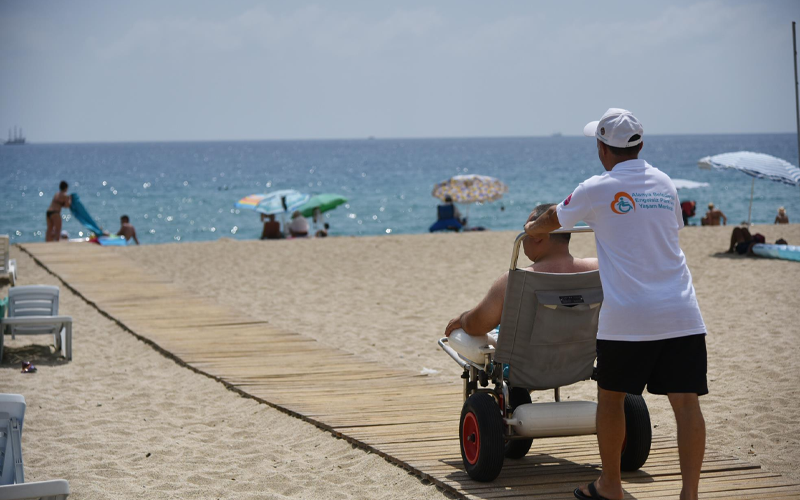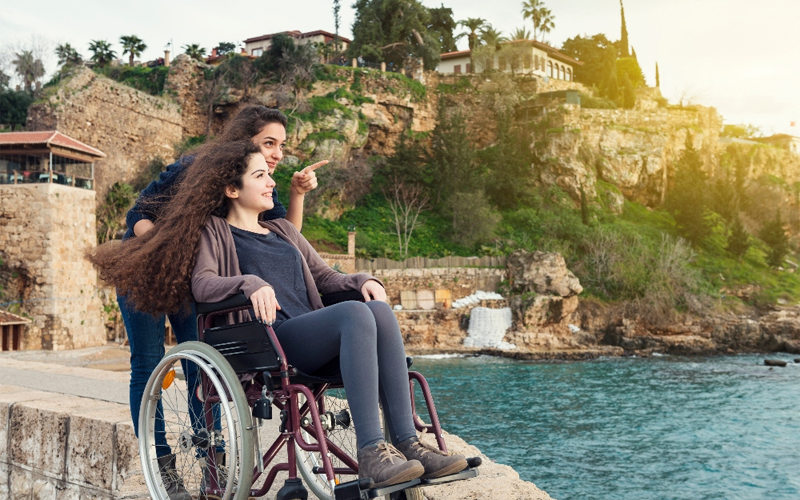Worldwide, the travel industry is constantly finding new ideas to make travel accessible to everyone. This includes the genre of disabled and handicap travel. Booking agents and official tourism organizations want disabled people to enjoy the same attractions, highlights, and destinations that able-bodied travellers visit. This is all good in theory but how does the country of Turkey accommodate them and what kind of assistance can they expect?
A Wheelchair User’s Guide to Istanbul, Turkey
Istanbul is a city rich in history and beauty. Oftentimes, places with a long history don’t offer the best accessibility. However, thanks to Istanbul trying to keep up with modern times, there are a number of wheelchair accessible things to do. We’ll show you how to navigate Istanbul with a wheelchair so that you can enjoy the “center of the world” to its fullest.
All Accessible Disabled Holiday Resorts With Accessible Accommodation Suitable for Disabled People in Turkey
Turkey is one of the holiday destinations that has something for everyone. For the beach addict, there are the warm waters of the Aegean and Mediterranean Sea and miles of sparkling coastline. A holiday in Turkey can be challenging for the disabled traveler, but armed with some prior knowledge you can be selective about where to go.
Istanbul is full of fascinating history, beautiful architecture and a surprisingly modern social scene, but many tourists are put off by the limited accessibility. However, many museums are now designed for all visitors.
The equally fascinating Basilica Cistern, a cave-like underground structure perfect for hot days, has a wheelchair lift at the back.
The ever-popular river cruises on the Bosphorus offer seats accessible to people with disabilities, while Hagia Sophia Temple and the Blue Mosque are within a kilometer of each other, making it easy to visit the city's main attractions together. Accessible hotels are available, but may need to be double checked on the correct slopes and suitable rooms. While the sidewalks are uneven and many of the buildings are pre-modern, things are getting better and this intriguing city is definitely worth the extra effort.
Elsewhere in the country, the Turkish Riviera on the Mediterranean is known for its sparkling coastline and offers some top facilities in its hotels and resorts. The Gulf of Antalya has beautiful pools and beautiful mountain scenery, and Antalya itself has benefited from an improved tram system. Tasteful smaller resorts like Side, Alanya, Belek, Kemer and Lara are also equipped with flat walkways and beachfront accommodation, unlike the older towns, and have become popular with disabled travelers.
While the main resorts, such as Bodrum and Marmaris, on the Aegean coast may be better in terms of accessibility, the crowds and busy nightlife don't appeal to everyone. For a calmer Turkish experience, try the Bozborun Peninsula near Datca, tucked away among wooded hills.
An enjoyable holiday in Turkey, as everywhere, is mainly a matter of thorough research. In general, the southwest coast and many of the Mediterranean and Aegean resorts have been duly modernized and cater for all needs. Larger cities like Istanbul have decent, modern airports with good transfers and a number of updated metro and ferry systems.
Airports
Luckily, Turkey has been building lots of new airports in recent years, and these are designed to modern standards to accommodate handicapped travelers. Airports at the largest cities (Ankara, Antalya, Istanbul, İzmir) are easily navigable, with jet bridges, assistants, wide doors, ramps, curb cuts, etc. At smaller airports, there probably won’t be jet bridges, so deplaning is by staircases rolled up to the plane door. Check for particulars.
Hotels
Many of the newer, better hotels have guest rooms and other facilities designed for easy accessibility, including ramps, elevators/lifts, hallways, public rooms, guest rooms,toilets, etc. Unfortunately, most of the older, smaller, cheaper lodgings present difficulties such as lack of elevators/lifts, or lifts difficult or impossible to use with a wheelchair, tiny bathrooms, raised thresholds, etc. Check with individual hotels to see if they can acommodate your needs, or ask one of my recommended travel agenciesto help.
Local Transport
Some bright spots here: the modernized transport networks in some major cities (Istanbul, Ankara, İzmir) are pretty well adapted for handicapped travelers. The Istanbul Metro and Bağcılar-Kabataş trams, the Marmaray,Füniküler, and the “Sea Bus” catamaran ferries were designed with European standards of accessibility in mind. City buses have seats reserved for özürlü passengers, but so far as I know, there are no buses adapted for easy access of wheelchairs (“kneeling bus”). The charming traditional ferryboats have not been adapted for wheelchair access, although access may be possible with assistance.
Disabled Travellers in Istanbul
Most people on their first visit to Turkey want to see Istanbul. As the colourful metropolis between East and West, its main attractions date from the Byzantine and Ottoman eras. It has also adopted most western practises so disabled people can enjoy their time there. Here are a few pointers regarding the main sites to see.
Most attractions are in the Sultan Ahmet area.
The Basilica Cistern has a separate entrance for disabled travellers.
The Blue Mosque does not allow wheelchairs inside because the carpet is very old; however, they provide their own wheelchairs that have clean wheels.
The Hagia Sophia has excellent wheelchair ramps into the main hall, although the upper level is impossible to reach because it is a winding staircase with cobbled stones.
The Topkapi Palace, former home to the Ottoman Sultans is mostly accessible. There are a few cobbled areas but the harem and treasury that are especially interesting can be easily accessed.
Another highlighted trip is a cruise of the Bosphorus and boats with allocated wheelchair ramps and staff will assist you.





